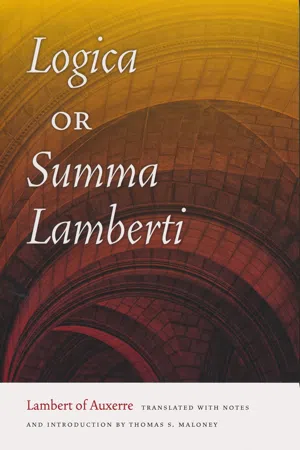
- 494 pages
- English
- PDF
- Available on iOS & Android
Logica, or Summa Lamberti
About this book
The thirteenth-century logician Lambert of Auxerre was well known for his Summa Lamberti, or simply Logica, written in the mid-1250s, which became an authoritative textbook on logic in the Western tradition. Our knowledge of medieval logic comes in great part from Lambert's Logica and three other texts: William of Sherwood's Introductiones in logicam, Peter of Spain's Tractatus, and Roger Bacon's Summulae dialectics. Of the four, Lambert's work is the best example of question-summas that proceed principally by asking and answering questions on the subject matter. Thomas S. Maloney's translation of Logica, the only complete translation of this work in any language, is a milestone in the study of medieval logic.
More than simply a translation, Maloney's project is a critical, comprehensive study of Lambert's logic situated in the context of his contemporaries and predecessors. As such, it offers a wealth of annotation and commentary. The lengthy introduction and extensive notes to the text explain the origin, theoretical context, and intricacies of the text and its doctrines. Maloney also addresses the disputed issues of authorship, date, and place of publication of the Summa Lamberti and makes available to the English-only audience the French, German, and Italian secondary sources—all translated—that are needed to enter the discussion.
Tools to learn more effectively

Saving Books

Keyword Search

Annotating Text

Listen to it instead
Information
Table of contents
- Cover
- Half title
- Title page
- Copyright
- Contents
- Acknowledgments
- Abbreviations
- Introduction
- Chapter One: Propositions
- Chapter Two: Predicables
- Chapter Three: Categories
- Chapter Four: Remarks after the Categories
- Chapter Five: Syllogism
- Chapter Six: Topics
- Chapter Seven: Sophistical Topics
- Chapter Eight: Properties of Terms
- Appendix A: Corrections to Latin Text
- Appendix B: Questions and Objections
- Notes
- Bibliography
- Index of Names and Works
- General Index
Frequently asked questions
- Essential is ideal for learners and professionals who enjoy exploring a wide range of subjects. Access the Essential Library with 800,000+ trusted titles and best-sellers across business, personal growth, and the humanities. Includes unlimited reading time and Standard Read Aloud voice.
- Complete: Perfect for advanced learners and researchers needing full, unrestricted access. Unlock 1.4M+ books across hundreds of subjects, including academic and specialized titles. The Complete Plan also includes advanced features like Premium Read Aloud and Research Assistant.
Please note we cannot support devices running on iOS 13 and Android 7 or earlier. Learn more about using the app